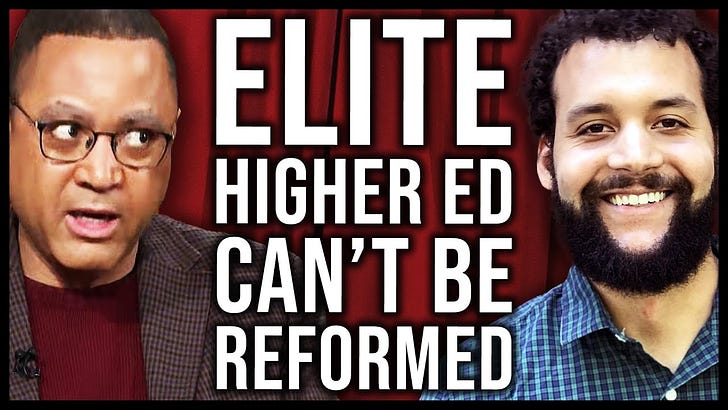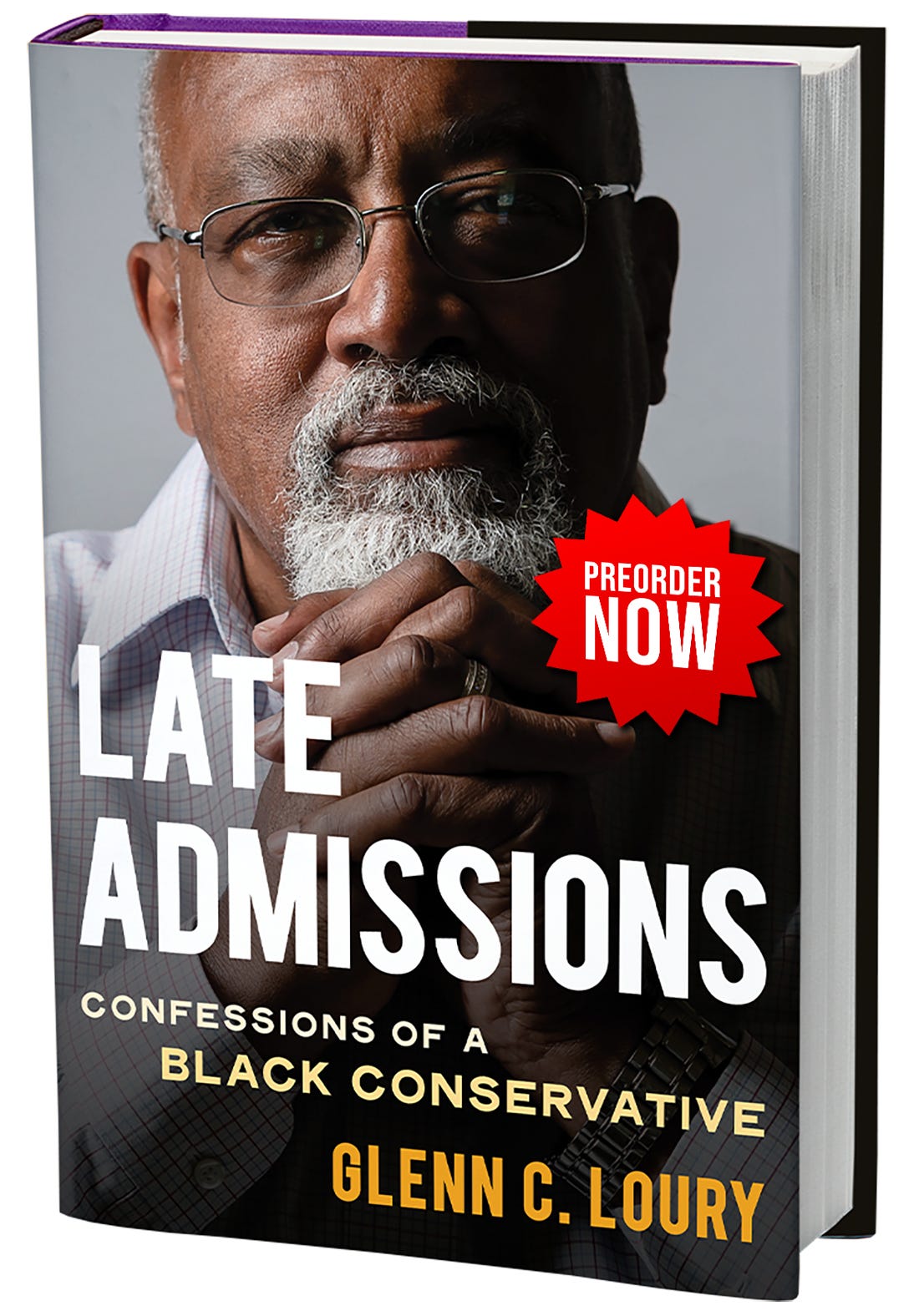Want to Get into Harvard? Show Off Your Trauma.
with John McWhorter and Tyler Austin Harper
In this clip, Tyler Austin Harper and guest host John McWhorter discuss university admissions policies that incentivize students to engage in performances of their identity. In the ever-tightening race for admission into elite schools, Tyler and John agree, applicants who can fulfill universities’ desire for a “diverse” student body stand a better chance. With explicit racial identification outlawed by last year’s Students for Fair Admissions Supreme Court decision, essays that play up students’ identity-based struggles have become one of the only ways for applicants to signal their “diverse” status. Both Tyler and John believe encouraging students to view themselves as “oppressed” can have profoundly damaging psychological effects, but neither of them thinks the situation will change any time soon.
This is a clip from the episode that went out to paying subscribers on Monday. To get access to the full episode, as well as an ad-free podcast feed, Q&As, and other exclusive content and benefits, click below.
TYLER AUSTIN HARPER: I don't necessarily have a ton of faith that elite higher education can be reformed in ways that are meaningful. I think there are a lot of baked-in problems. It's not easy to see how to dissolve them. And these institutions rightfully want diversity. There's limits on how they can achieve that. Now, thanks to the Supreme Court decision, they can't. No one can check a box. So the only way to signal diversity is through the college essay, which means this kind of performative discussion about race and trauma etc. is now really the only avenue for colleges to figure out who's diverse and for applicants to signal their diversity.
And I don't think there's much that can be done about it. In a perfect world, if I was in charge of Yale and Harvard and everything else, I would probably have SAT cutoffs, say 1300, and everything would be a randomized lottery above that. I am not the Emperor of Higher Ed. Other than some utopian solutions like that, I don't know that there's much to be done.
But I'm fascinated by it in the compulsory racial performance that not just black and brown students but also white students have to go through. I worked as a college tutor for many years, and one of the things that was striking to me is that I would work with wealthy white kids who are like, “Look, I'm not just rich and white. My dad's an alcoholic, so I haven't had an easy life” or “I'm neurodivergent” or this or that. Whereas I think racial performance and passing and code switching and all of these sort of ways of positioning identity used to be just folks of color, it's now expanded to everyone. And that's one of the things I'm interested in. This kind of racial performance is compulsory across the board, whether you're white, black, brown, yellow, or whatever.
JOHN MCWHORTER: All right, let me do devil's advocate here, because I feel the same way about these things as you. I don't see how it can change. There are times when you can't get the toothpaste back in the tube, and the basic commitments of perfectly sane and benevolent people who are now running elite institutions and also just institutions of learning, I don't see how it can change. There's a whole generation that's set in. Their hair is already graying and they're going to hire people like them.
I have to make up one of my characters. Her name is Monique. She's 17. Monique is a black girl. That's an antique black girl name now, but I don't want it to be too real. Monique is writing her essay, and she's not allowed to say she's black, but she's signaling that she's black. It's clear that anybody who reads this knows that she grew up maybe lower- or middle-class, and she's black. She signals it because there's a certain kind of experience that black people have that is uniquely unjust because of our history in this country and possibly the feelings against black people are more deep or more virulent than against others. I frankly don't think so, but Monique has been taught that and her parents probably think so. I could be wrong. So she signals it in her essay, and that does help her get into—I'm going to pick a place at random—Vanderbilt, Rice, whatever.
What's wrong with that? You're calling it a performance, and there are certain people who would bristle, but Monique may be thinking she's being a good human being in 2024, right?
So the first thing I would say about performance is that I come from the land of critical theory, and so I'm thinking about performance in the sense of someone like Judith Butler. We do all have to, in various ways, signal our identity to folks in power in ways that make us legible. My overall take and my very strong opinion is that we shouldn't moralize about this. We all, in various ways, particularly if you're folks of color, have to navigate the reality that people in hiring and admissions want diversity. They expect it to come in a certain kind of package. And that's the incentive structure.
I think there's a certain kind of, more conservative person who might say these people are just taking advantage of their identity to get a leg up, and blah, blah, blah. That's actually not my take at all. My take is the incentive structures are bad that compel most of us to play these kinds of games. And if you want to complain about it, I don't think you should blame the individual people who are just doing their best to find opportunities where they come. Like most of us, I think we should think about, why are these systems in place that require black kids to feel like they have to talk about trauma in their college essay? I think that's not on them. That's on administrators and admissions folks and other forces and universities that make the incentive structure look the way it does.
Just like you find a megalosaurus bone in England, and it's this enormous thing and there are no lizards walking around that big and you're trying to figure out how things go. We think, couldn't they figure out that things had gone extinct? But no, you really have to pull the camera back. In the same way, I think a great many people today—and not just Monique. I think just people of color and particularly this color. I think that we tend to forget how weird it is in human history for the bedrock of your racial identity and the thing that probably gets your endorphins going is a sense of yourself as oppressed.
The idea that is the main thing about you and the thing that you're almost proud of, that you get through life despite the oppression. It's understandable where that comes from among black people. And I know what everybody's thinking: what about Jewish people? But that's the thing. It's different. Yes, there's an idea of we will never forget. There's an idea that we're constantly persecuted. But it's not the center of Jewish identity to feel that there are people who think we're inferior and we just might be and we're going to give into it a little bit. No, the idea with Jewish people is we're not inferior.
I'm not sure that black people always know that as much. It's understandable why, but it's a very unusual sense of identity. And this way of writing an essay encourages that. So how do you show that you're black? Something bad happened to you. I find that unhealthy, but I don't know if it can be fixed.
I agree. I find it totally unhealthy. I find it psychologically deforming. I think it programs students to think a certain way about themselves. And it's not just black students. When I was at NYU, I had a student who warned me at the beginning of the semester that they are a mentally fragile person and that I should be aware of that.
On the one hand, whatever accommodation someone has, it's fine. That's for someone else to decide, not me. But what stuck with me was the way she framed it. It wasn't “I have XYZ condition that might make ABC things difficult for me” or “I might need more time” or whatever. It was like, “Who I am is mentally fragile.” And I think that it's not just race. It's all sorts of other stuff, where many of us are now programmed to think on a deficit model. I don't think it's especially healthy. It's understandable in a lot of ways. I'm a big fan of the historian Christopher Lasch. He wrote a book called The Culture of Narcissism where he made the point …
Literally, I read it last week just by chance.
Oh, nice. I'm a big Lasch fan. The point he makes there is, yes, there is this narcissistic self-absorption and this wounded mentality and victim etc. But it's a result of economic forces. This isn't just a cultural change. In other words, this isn't people who need to pull themselves up by their bootstraps. The world is uncertain. And in the '70s, Lash was talking about nuclear anxiety, environmental and economic anxiety, inflation, whatever. Today it's really the same. And I think there's a certain narrative that's these kids are snowflakes and they need to buck up. That's not entirely wrong. There is a cultural dimension to everything, but also they're doing it for a reason.
Yeah. Calling them names doesn't make any sense.
Yeah, exactly. And universities are increasingly a rat race. College acceptance rates have plummeted over the last few years. It's remarkable. I think Boston College has dropped from, in the last decade, a 40 or 50 percent acceptance rate to a 20 percent acceptance rate. The school I teach at's dropped like a stone. There are a lot of pressures on these kids. There's academic pressure, there's environmental pressure, they're worried about climate change, there's war, there are a lot of problems. So even as I find I agree with you that this orientation is really bad for people, minorities in particular, I also think it's understandable in a certain way.
Yeah, it's throughout the culture. That book was one that I had pretended to have read forever, and then I realized, no, I need to actually read it. I was just thinking, I wish he were writing now, because the book is now inevitably dated in terms of its references. I was thinking that I agree with everything he's saying, or like 90 percent of what he's saying, except I think also there's a mission creep to it.
And you're right that now this is all over the culture. It's by no means just black students and black people, but there's a mission creep, I think, from the Civil Rights Movement, where it starts with activism. You want to go change the world. But there's also a sense of purpose and a certain sense of fellowship that you get when you are engaging in activism. When the more concrete things are finished, when you've got a Civil Rights Act of 1964, you've got the Fair Housing Act, so you don't have the apartheid that there used to be, once that happens, you might still want to keep going.
There's a part of humanity that likes feeling united against an enemy. That's probably cooked into us because of our deep past. And I think that mission creep starts in the '70s. I think that then other groups look to black people and model their sense of identity on this idea of being a victim. It's not that people are snowflakes. It's not that people are manipulative. There's no such thing as a poverty pimp. All of us are atoms caught up in all of this. No one can be blamed. But we live in a weird time. In a way, I understand this less than I understand what was going on 50 years ago.








Very true. As a note from my lived experience as a high school teacher, I asked students a few years back, as part of a writing exercise, to respond to the prompts of the common app, found here: https://www.commonapp.org/blog/2019-2020-common-app-essay-prompts
What I received was a boatload of essays (more or less well-written) in which almost all of them referenced some form of trauma, however one defines that. Even in responses to prompts that had nothing to do with adversity, students were eager to talk about how they experienced terrible things in their lives which sent them into mental / depressive spirals. These were things like: breaking a bone (causing them to miss "the big game") or "toxic friends" they needed to dump. I don't think there was anything in there outside of what I would call ordinary experience.
And, as noted in this episode, this is something the admissions types seem to foster intentionally, but it has now become part of the common zeitgeist.